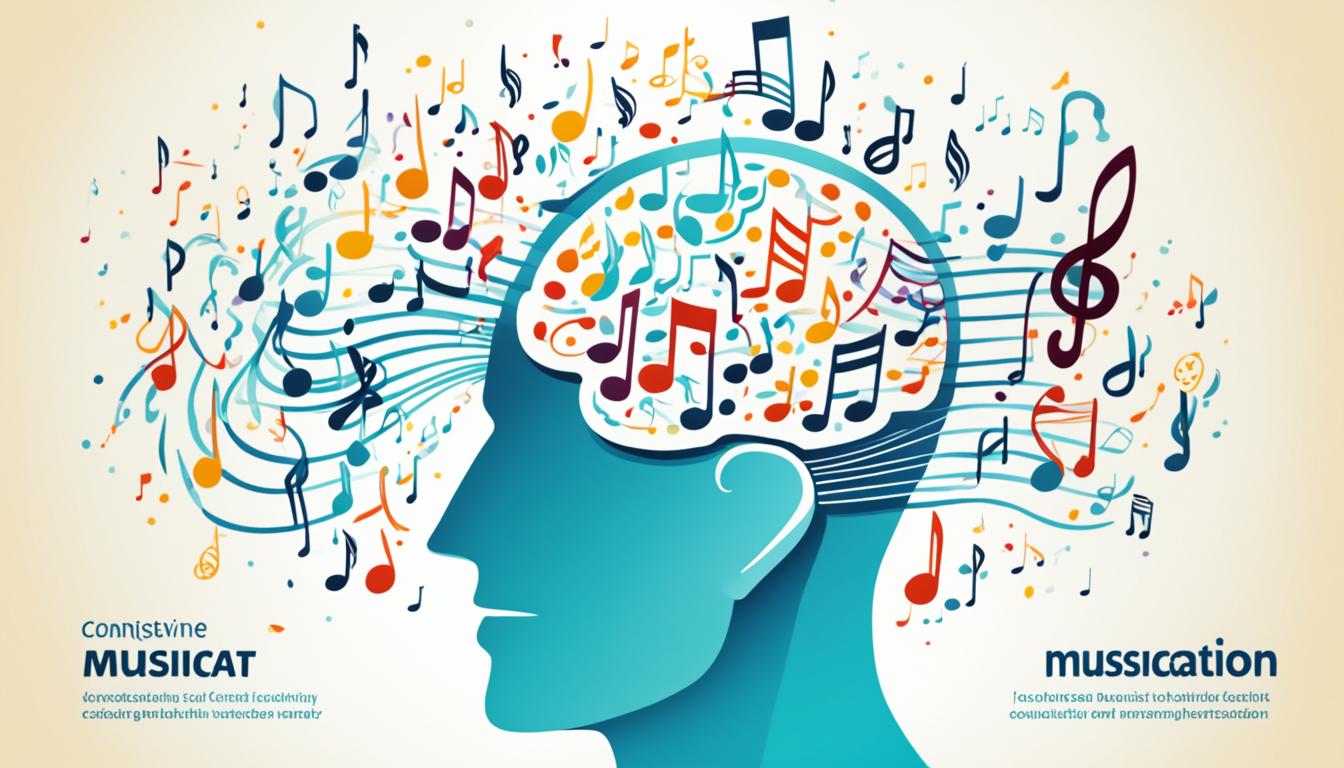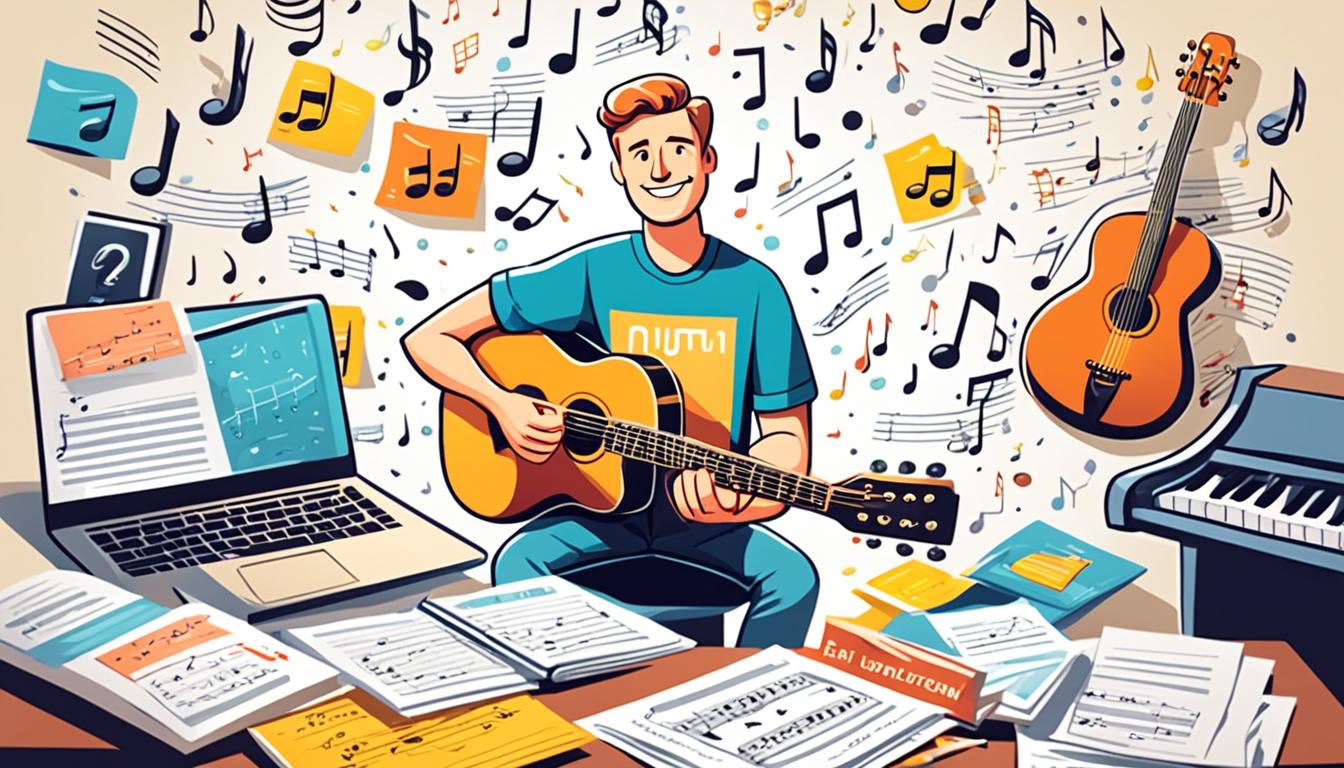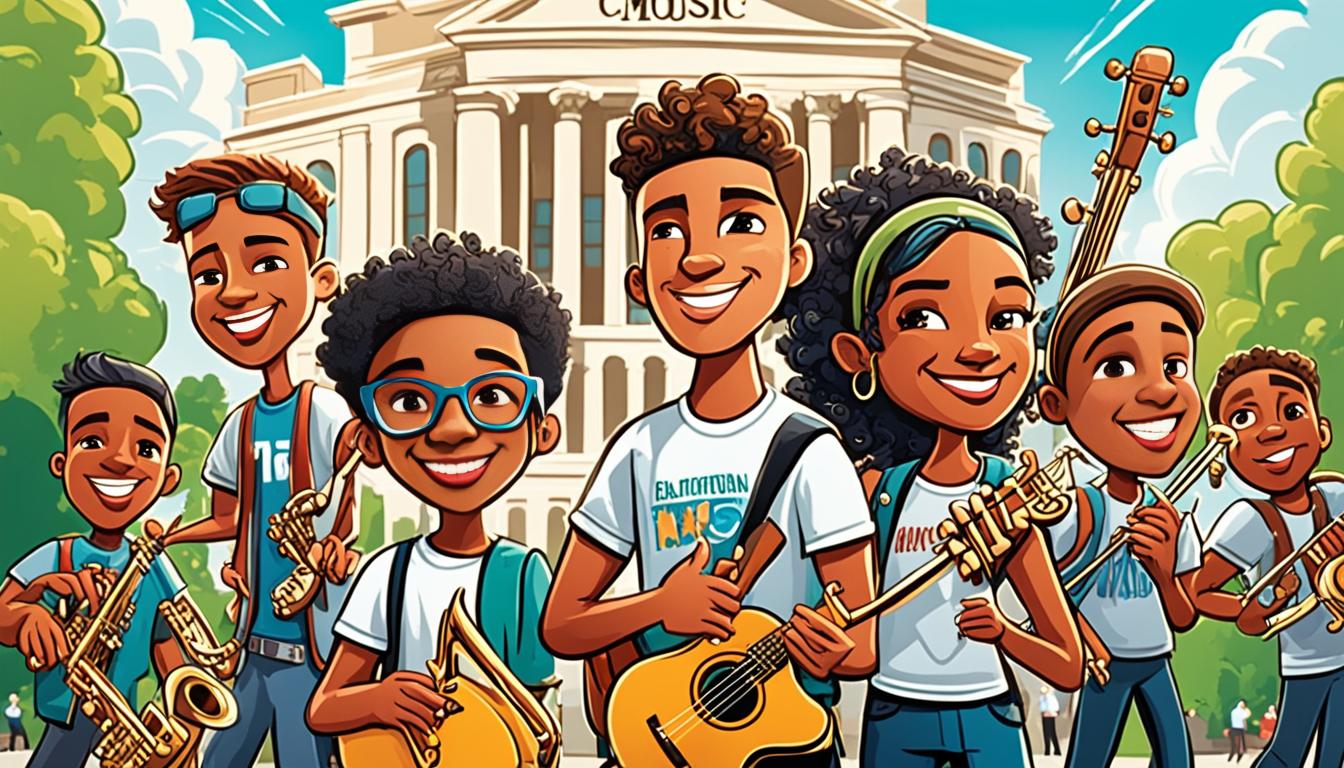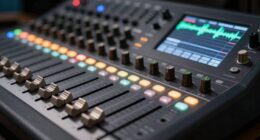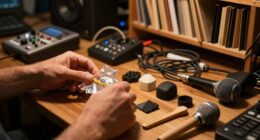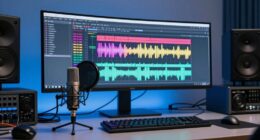Picture this: a classroom alive with music as students play instruments, their faces glowing with happiness and focus. Music education opens our minds, boosts brain development, and makes us feel emotionally better. Studies over the years have explored how music education greatly benefits our brains.
Students in music programs often do better in school. The College Entrance Examination Board found they score 63 points more on the verbal and 44 points more on the math sections of the SAT than other students1. A study with 5,154 fifth-graders showed those playing an instrument had better grades than kids not learning music1. Another study over 10 years with 25,000 students showed that those making music scored higher on tests, no matter their background1.
Music education brings more than just better grades. It teaches important life skills like working together, believing in yourself, and being creative1. National studies prove that the arts keep students who might drop out interested in school1. Students in bands or orchestras have the lowest drug and alcohol use1. This shows music education’s role in improving social well-being and preventing substance abuse.
Music affects the brain positively, whether you’re playing or just listening. It uses both sides of the brain, helping us learn and remember better2. Music can lower stress and improve mood, with certain styles like hip-hop lifting spirits2. It can even help students do better in stressful situations, like tests2. Music also helps lessen pain and manage stress and anxiety in healthcare settings2.
Children with regular music classes see better vocabularies, reading skills, and study habits3. Music also improves coordination and team work, making a close community of students3. Musicians have more grey matter in their brains, helping them think and solve problems better3.
Music education boosts school performance, brain work, and social health for students everywhere. Next, we will explore how musical training changes the brain, helps with thinking, feeling good, and getting along with others. Join us on this melody-filled journey of learning.
Key Takeaways:
- Music education enhances academic performance, with students in music programs scoring higher on standardized tests1.
- Participation in music programs fosters essential life skills such as cooperation, self-confidence, and creative expression1.
- Listening to music while studying activates both hemispheres of the brain, improving learning and memory2.
- Music education improves vocabulary, reading comprehension, hand-eye coordination, and study habits3.
- Engaging in music programs creates a sense of community and reduces substance abuse among students1.
The Power of Musical Training on Brain Plasticity
Research shows that musical training does wonders for the brain. It improves how the brain grows and changes. This plays a big part in learning and brain function.
Musicians have brains that look different from non-musicians. They have more gray matter in areas important for hearing, motion, and combining senses. These areas help with how we perceive sound and motion4.
The more you train in music, the bigger these brain changes are. The brain’s white matter, like the corpus callosum, also improves with lots of practice4.
Starting music training early is especially good. It can make you better at remembering words, pronouncing new languages, reading, and planning. These are skills that help in lots of areas in life4.
Music training doesn’t just help with music skills. It also boosts other brain functions. It has a ripple effect, improving various cognitive abilities4.
Music training involves getting in sync with rhythms and working with others. These activities are key for the brain to develop and change. They boost the benefits of playing music4.
Playing an instrument needs many skills like reading notes, controlling small movements, remembering pieces, and making up music on the spot. These improve focus and other important brain functions4.
| Brain Regions | Structural Differences in Musicians |
|---|---|
| Auditory Cortex | Increased gray matter volume |
| Motor Cortices | Increased gray matter volume |
| Somatosensory Areas | Increased gray matter volume |
| Premotor Cortex | Increased gray matter volume |
| Inferior Temporal and Frontal Regions | Increased gray matter volume |
| Cerebellum | Increased gray matter volume |
| Corpus Callosum | Structural changes in white link matter tracts |
This research tells us music training shapes the brain. It boosts thinking skills and supports mental agility throughout life4.

Musical Instruments Set, 15PCS Natural Wooden Percussion Tambourine Maracas Bells Instruments, Educational Music Kit with Storage Bag Birthday
★[Natural Wood Instrument Kit]: Made by natural wood including shaking, tapping, beating and blowing instruments. Ideal and creative…
As an affiliate, we earn on qualifying purchases.
As an affiliate, we earn on qualifying purchases.
Enhancing Cognitive, Emotional, and Social Functions Through Music Education
Music education does more than fill our lives with tunes and beats. It plays a big role in our thinking, feeling, and connecting with others. It brings lots of benefits, showing how important it is for a well-rounded education.
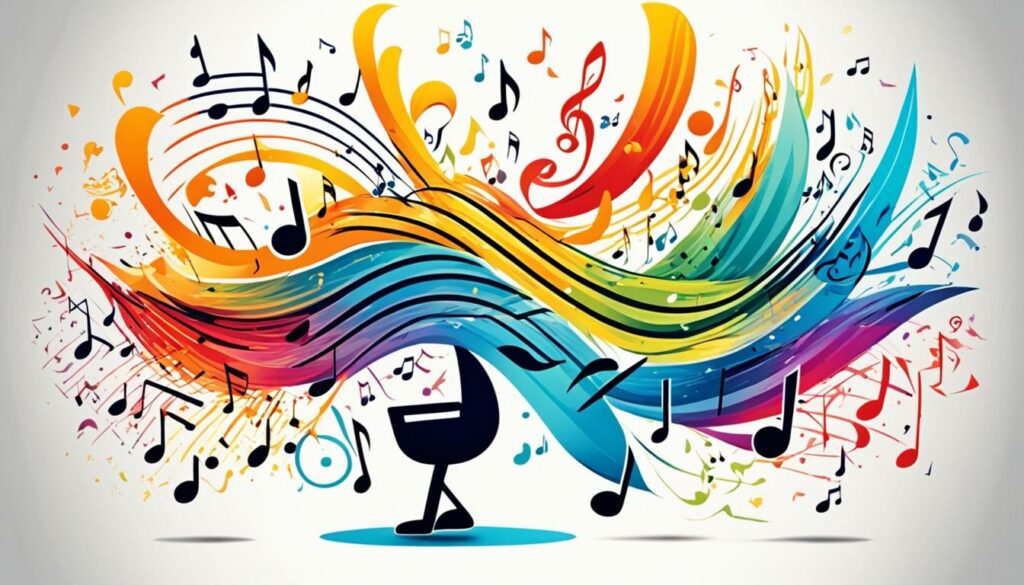
Kids who learn music do better in subjects like math and English. Playing an instrument helps develop musical skills and needs lots of practice. This practice strengthens the brain by forming new connections and boosting thinking skills.
Music also helps us remember better. It works on our memory in a way that improves how we recall information. By engaging in music, several parts of the brain get used. Skills like listening closely and remembering tunes help us think sharper.
The emotional effects of music are strong. It can make us feel all sorts of emotions and touch parts of our brain linked to feelings and happiness. Playing music with others makes this even stronger, helping us share and understand our emotions better.
Being part of music groups, like bands or choirs, is great for getting along with others. It encourages teamwork, sharing, and understanding, making us feel part of a community. Research even shows that kids who sing with others often do better in school.
To wrap it up, music education helps us think, feel, and connect better. It boosts grades, helps with memory, and makes us happier. Kids who play music can be more creative, less stressed, and have stronger friendships.
| Music Education Benefits | References |
|---|---|
| Enhanced academic performance in subjects like mathematics and language | 5 |
| Improved memory consolidation and retrieval pathways in the brain | 5 |
| Reduced physiological and psychological effects of stress | 5 |
| Enhanced social skills, communication, coordination, cooperation, and empathy | 5 |
| Improved academic performance for children who sing in choruses | 6 |

Kids Learning Games, ABC For Preschool Toddlers 2-4 year olds, KidloLand Nursery Rhymes, Songs
3000+ Fun educational activities, lullabies, stories, songs, educational games for preschool kids & toddlers
As an affiliate, we earn on qualifying purchases.
As an affiliate, we earn on qualifying purchases.
Music Education as Academic Strength Training
Music not just sharpens kids’ music skills but also boosts how well they do in school. Studies have found that kids learning music do way better than those in sports or dance7. It’s like music helps their brains and memory grow.
When kids play an instrument or learn music, they get better at reading and speaking. It’s like when they play music, they use the same parts of the brain that help them learn words and read. Also, learning music makes it easier for them to learn how to read. So, playing and learning music can make learning languages easier, too.
Students who study music do better in school than their friends who don’t7. They are more likely to finish school and read better. Even music majors have a better chance of getting into medical school7. Music really helps with school success and future plans.
Music not only helps with schoolwork but also makes the brain work better. Some kids see improvements in just 20 days of music study7. After studying music for a few years, the benefits are even bigger. Music helps the brain get better at thinking and understanding emotions8.
Music is great for all kids, even those who learn differently or have disabilities7. It helps their brains grow and makes them better at talking and understanding feelings. Kids in music for a long time do better in school and feel more hopeful about the future9. Music helps make learning fair for everyone, even kids from places without a lot of money9.
| Benefits of Music Education | Statistical Data Reference |
|---|---|
| Enhancement of academic performance, language development, reading ability, memory, and attention | 7 |
| Higher likelihood of graduation and improved literacy | 7 |
| Increased acceptance rate for medical school applications | 7 |
| Immediate cognitive benefits and brain rewiring for cognitive tasks | 78, |
| Boost in social development, emotional awareness, and language development for children with disabilities | 7 |
| Positive impact on competence and hopeful future expectations | 9 |
Music does more than just make students smarter. It helps them emotionally and socially, too. Music gives a well-rounded education and helps kids succeed in many ways.
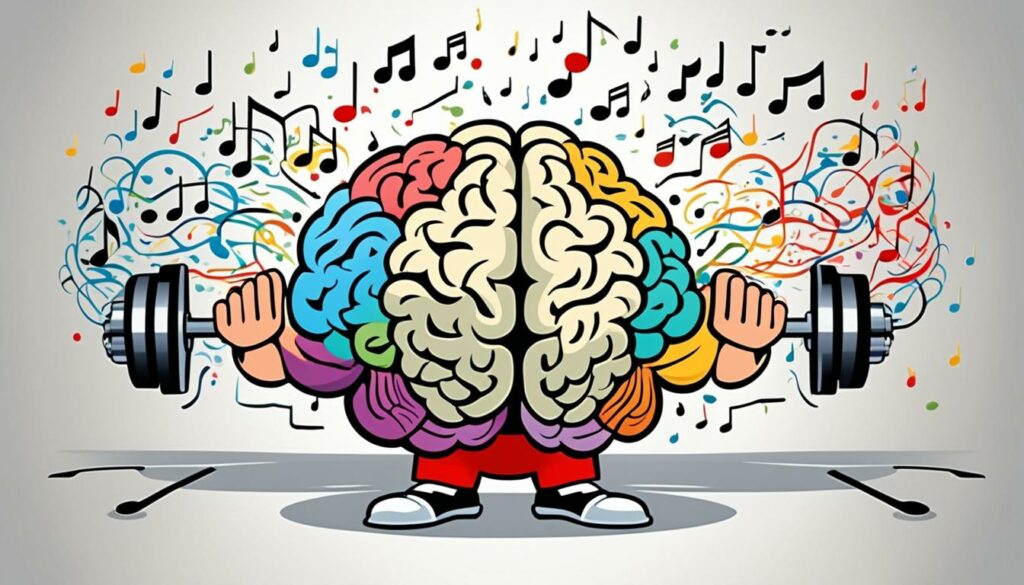

How to Read Music in 30 Days: Music Theory for Beginners – with exercises & online audio (Practical Musical Theory)
As an affiliate, we earn on qualifying purchases.
As an affiliate, we earn on qualifying purchases.
The Sound of Social Cohesion
Music brings us together, creating a strong sense of unity. When we sing or play instruments with others, we feel a deep connection. This creates a strong social bond and encourages kind acts.
Studies reveal playing music in groups boosts our ability to empathize10. Group music activities help us understand and share feelings better. They forge deep connections and encourage caring behaviors.
For young learners, music in school goes beyond melodies. It creates a welcoming environment and builds strong friendships. Students learn to work as a team and support one another11. They grow in confidence and character, vital for a kind society10.
Yet, not all kids get to enjoy music class. A 2014 survey found 1.3 million elementary students missed out on music education. Close to 4 million didn’t have art classes11. It’s crucial we fight for music programs for every student.
Intempo, a nonprofit, shows music’s power in schools. It reaches over 3,000 students each year, helping them connect through music11. Intempo’s efforts demonstrate how music can build a caring community11. Programs like this remind us of music’s role in society.
The Benefits of Music Education for Social Cohesion
Music unites people, forming strong communities. Joining in music making fosters connection and belonging. School music programs not only improve social skills but also empathy and kindness. Supporting music education for all is key to social unity.
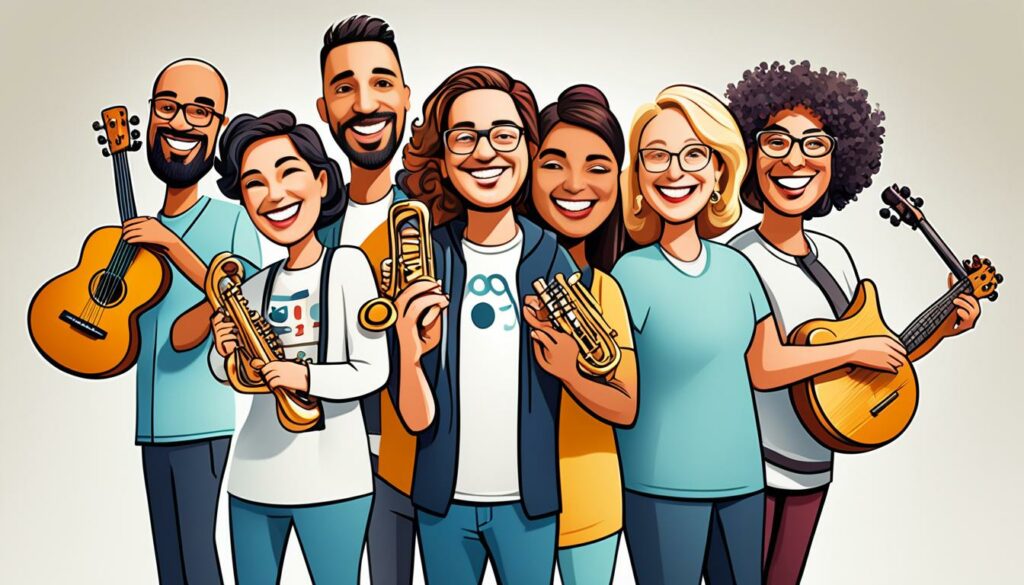

Kids Musical Instruments, 33Pcs 18 Types Wooden Percussion Instruments Tambourine Xylophone Toys for Kids Children, Preschool Education Early Learning Musical Toy for Boys and Girls
[A Complete Kids Musical Instrument Set] – Including 33pcs 18 types shaking, tapping, beating and blowing instruments. Better…
As an affiliate, we earn on qualifying purchases.
As an affiliate, we earn on qualifying purchases.
Immediate and Long-Term Benefits of Music Education
Music education has both immediate and lasting perks for people of all ages. It especially improves thinking and school success. The effects of music on our brains are well-proven by science.
| Immediate Benefits | Long-Term Benefits |
|---|---|
|
|
Music education also fosters positive traits like confidence, independence, and leadership. These traits help students succeed in many areas of life12.
Studying music for 2-3 years can greatly benefit academics, such as language and math skills. It also helps keep the brain sharp, reducing the risk of Alzheimer’s12.
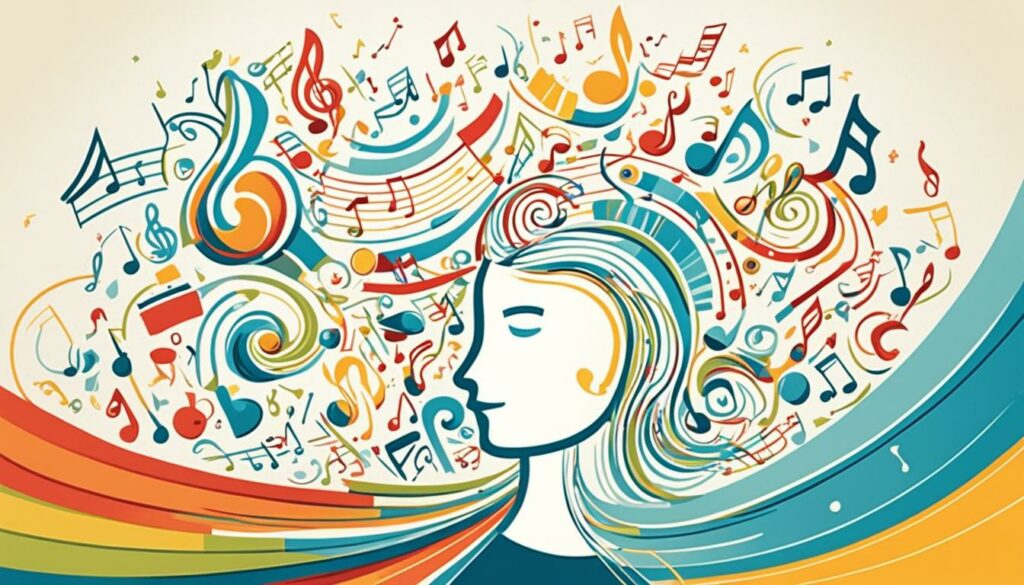
Being involved in music education helps us appreciate music more and boosts our brain power and school performance. Whether through lessons, playing an instrument, or joining a school program, music education is powerful. Let’s embrace music education and see how it helps us grow personally and academically.
Music Education for All Ages
Music education is more than just for kids. It helps people of all ages in many ways, like improving brain functions, allowing self-expression, and easing stress14. No matter your age, learning music can greatly benefit your mind and happiness.
Lifelong Learning and Self-Expression
Music is a special way to show who you are and share feelings with others14. By being part of music programs, people at any age can grow their musical skills, learn something new, and explore their creative side. Music lets you express yourself, boosts your confidence, and makes you feel accomplished.
Brain Health and Music
Studies show music education is good for your brain, especially for thinking skills and memory1415. Playing an instrument or singing works out different brain parts. This helps the brain change and get better at its tasks. Music even improves learning things like solving problems and math15. Making music a part of your life keeps your brain sharp, no matter your age.
Stress Relief and Emotional Well-being
Music education is great for reducing stress and lifting your mood1416. Making music, singing, or just listening can relax you. It brings out feelings, cheers you up, and lets you express emotions. Music helps in dealing with stress, anxiety, and keeps your spirit high.
| Age Group | Benefits of Music Education |
|---|---|
| Children | Improves cognitive skills, memory and language, attention span, and helps in making friends through group activities1516. |
| Adults | Better thinking abilities, relaxation, more self-expression and creativity, and improved listening and talking skills1416. |
| Seniors | Keeps the brain healthy, encourages socializing, adds to life’s joy, reduces stress, and enhances well-being1415. |
Regardless of age, music education brings precious advantages. It helps brain growth, good health, sharing yourself, and finding comfort. Let music education enrich your life at any stage, discovering its vast benefits.
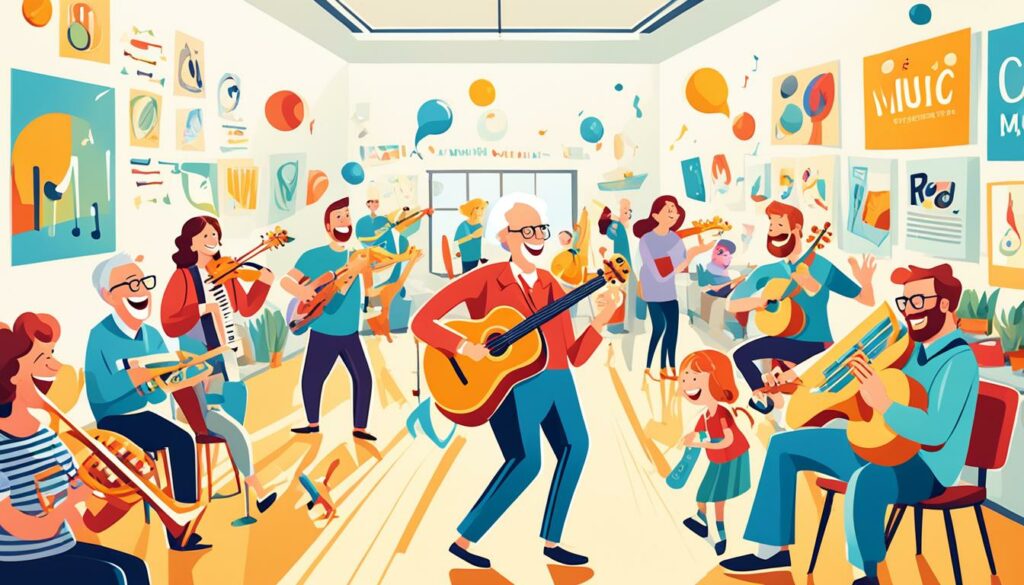
Music Education for Children with Disabilities
Music education is very important for kids with disabilities. It helps them grow and develop in many ways. They get better at thinking, feeling, and connecting with others, which makes them happier.
About 56.7 million people in the U.S. have a disability. This is 19% of the population17. Of them, 7 million students get special education services at public schools17. In the last five years, more students with special needs have joined music programs. People see how music can really help them17.
Music helps these students think better in ways related to their disabilities17. It can make their hand-eye coordination and concentration stronger. Rhythmic activities that include moving can greatly improve how they move17. Music lessons can also grow more grey matter in their brain. This is especially clear in kids who play the keyboard17.
A study showed that children who learned piano or string instruments had more brain growth than kids who didn’t play an instrument17. Music can change the brain of kids with disabilities in a good way. One young boy with ADHD and other challenges saw big improvements by playing the tenor horn17.
Music’s impact isn’t just in the U.S. but also worldwide. It has been part of human culture for over 35,000 years18. Playing and listening to music can make our brains work better. It can help us remember things and be more creative. The American Music Therapy Association says music therapy can help people facing health and education challenges18.
In schools, music helps students with disabilities feel like they belong18. It lets them express their feelings and relax. Music can even be part of their personalized education plans to improve many skills18.
Many people with disabilities feel left out. But music gives them a sense of community18. Everyone should have access to music education and therapy. This includes students of all abilities18.
In Sweden, about 75,000 people get help under the Law on Support and Service for the Disabled (LSS)19. Those with disabilities often have it tougher than others19. A music program called Music Passion was started to help them from 2014 to 201819.
Music Passion involved theatre and dance, ending with a yearly show19. It was for everyone, no matter their interests. The program aimed to help participants learn music, work together, build confidence, and perform19.
They learned to play instruments, sing, work in ensembles, and even act19. The program was checked to make sure it was ethical and followed special rules19.
Music education is very powerful for children with disabilities. It improves their language, confidence, and awareness. It also helps kids with autism in many ways17. Plus, it can make learning easier for all kids, helping them do better in school and life17.
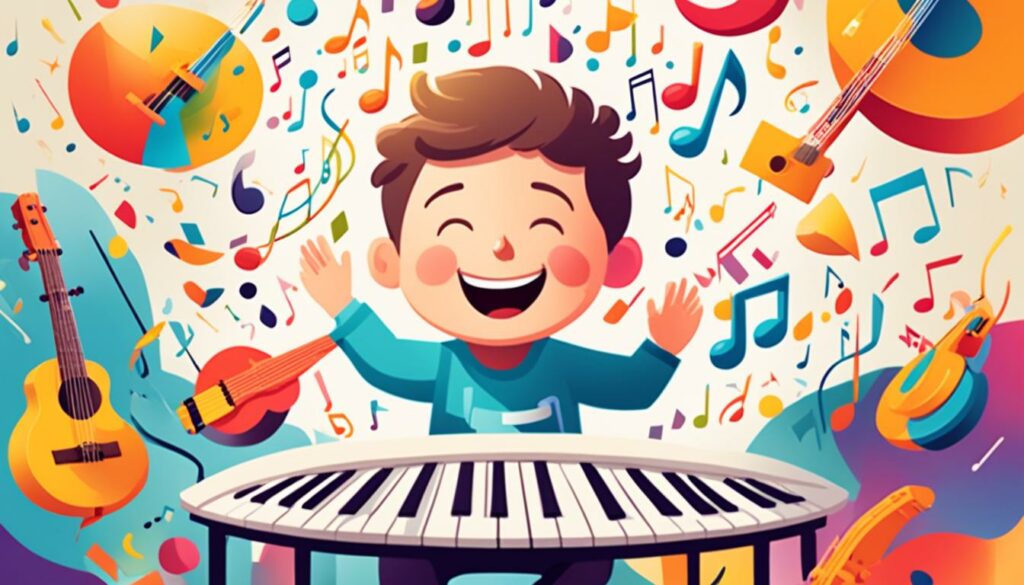
Conclusion
Music education greatly influences our brains and feelings, offering benefits that last a lifetime. Studies prove that music improves our brain’s flexibility. This leads to better brain structures and functions20. It helps with learning languages and reading. Plus, it makes us feel more connected with others21. Being exposed to music early on can predict how well we’ll do in school and our IQ. This sets us up for success in life21.
Music doesn’t just help our brains grow; it also makes us more emotionally intelligent and empathetic21. It boosts our problem-solving abilities, our ability to concentrate, and our memory21. This means we do better in school. Having the chance to create music builds our self-image, confidence, and self-esteem21. When we play music with others, we learn how to work as a team20.ㅜㅜㅜㅜㅜㅜㅜㅜㅜㅜㅜㅜㅜㅜㅜㅜㅜㅜㅜㅜㅜㅜㅜㅜㅜㅜㅜㅜㅜㅜㅜㅜㅜㅜㅜㅜㅜㅜㅜㅜㅜㅜㅜㅜㅜㅜㅜㅜㅜㅜㅜㅜㅜㅜㅜㅜㅜㅜㅜㅜㅜㅜㅜㅜㅜㅜㅜㅜㅜㅜㅜㅜㅜㅜㅜㅜㅜㅜㅜㅜㅜㅜㅜ두문ㅜㅜㅜㅜㅜㅜㅜVisual Communication.
In tough times, like the COVID-19 pandemic, music education has been crucial for mental health. It helps us deal with personal struggles, control our feelings, and fight anxiety and depression22. Music is a way to communicate healthily, keep a good mindset, and avoid depression in schools22. Music arms us with the skills to face life’s difficulties. It boosts our mental and emotional well-being throughout our lives.
FAQ
What are the cognitive benefits of music education?
How does musical training impact brain plasticity?
How does music education foster emotional and social development?
Does music education improve academic performance?
How does music contribute to social cohesion?
What are the short-term and long-term benefits of music education?
Is music education beneficial for individuals of all ages?
How does music education benefit children with disabilities?
What are the overall benefits of music education?
Source Links
- https://online.campbellsville.edu/program-resources/benefits-of-music-education/ – 3 Benefits of Music Education | CU Online
- https://www.fnu.edu/benefits-studying-music/ – The Benefits of Studying with Music – Florida National University
- https://nebhe.org/journal/tuning-in-six-benefits-of-music-education-for-kids/ – Tuning In: Six Benefits of Music Education for Kids | New England Board of Higher Education
- https://www.ncbi.nlm.nih.gov/pmc/articles/PMC3957486/ – How musical training affects cognitive development: rhythm, reward and other modulating variables
- https://www.virtu.academy/blog/the-impact-of-music-education-on-brain-development – The Impact of Music Education on Brain Development
- https://www.kaufmanmusiccenter.org/the-power-of-music-education/ – The Power of Music Education
- https://meritmusic.org/benefits-music-education/ – Benefits of Music Education | Merit School of Music
- https://www.frontiersin.org/journals/psychology/articles/10.3389/fpsyg.2022.938090/full – Frontiers | Impact of Music Education on Mental Health of Higher Education Students: Moderating Role of Emotional Intelligence
- https://today.usc.edu/music-education-research/ – USC researchers find music education benefits youth wellbeing
- https://playingforchange.org/why-music/ – The benefits of music education – Playing For Change Foundation
- https://www.edutopia.org/article/how-music-primes-brain-learning/ – How Music Primes the Brain for Learning
- https://tjmfdn.org/wp-content/uploads/2014/06/BenefitsofMusicEd-1_1-1.pdf – PDF
- https://www.brighthorizons.com/resources/Article/music-and-children-rhythm-meets-child-development – Children and Music: Benefits of Music in Child Development
- https://www.ncbi.nlm.nih.gov/pmc/articles/PMC9240095/ – Impact of Music Education on Mental Health of Higher Education Students: Moderating Role of Emotional Intelligence
- https://www.savethemusic.org/blog/benefits-to-the-brain/ – Benefits of Music Education: Social & Cognitive Development
- https://degree.lamar.edu/online-programs/education/master-music-education/music-education-matters-to-cognitive-development/ – Music Education Matters to Cognitive Development
- https://digitalcommons.liberty.edu/cgi/viewcontent.cgi?article=2149&context=honors – The Social and Cognitive Effects of Music Education on Special Needs Students
- https://medium.com/educreation/unlocking-the-power-of-music-517a5a27c462 – Unlocking the Power of Music
- https://www.ncbi.nlm.nih.gov/pmc/articles/PMC9816321/ – Music education contributes to development and personal change in young adults with disabilities
- https://www.musicteachernotes.com/articles/music-education-the-benefits-of-learning-an-instrument/ – Music Education: The Benefits of Learning an Instrument | MusicTeacherNotes
- https://playingbrass.com/index.php/2023/10/09/benefits-of-music-education-for-children-research-based-insight/ – The Benefits of Music Education for Children: A Research-Based Insight – Playing Brass
- https://www.frontiersin.org/journals/psychology/articles/10.3389/fpsyg.2022.841204/full – Frontiers | Exploring the Impact of Music Education on the Psychological and Academic Outcomes of Students: Mediating Role of Self-Efficacy and Self-Esteem

